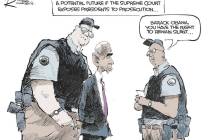Big day at the high court
After weeks of silence, the U.S. Supreme Court is back at the top of the news. On Monday, the justices announced they will weigh in on the divisive issue of indecency. And today, the court will hear arguments on a potentially historic Second Amendment case.
Indeed, Heller v. District of Columbia stands to become the court's seminal ruling on gun ownership.
The District of Columbia is appealing a ruling by the city's U.S. Circuit Court of Appeals that the capital's 32-year-old handgun ban is unconstitutional. The District had rejected an application from 65-year-old security guard Dick Heller to store his sidearm at his home for self-defense purposes. But Mr. Heller's attorneys successfully argued that the city law, which requires approved handguns and rifles to be disassembled and locked up separate from ammunition, violated his Second Amendment rights.
The significance of the case can be seen in the 68 briefs filed by outside groups, most of them supporting an individual right.
"This may be one of the only cases in our lifetime when the Supreme Court is going to interpret an important provision of our Constitution unencumbered by precedent," Georgetown University law professor Randy Barnett said.
That assertion is both fascinating and frightening, given that many would have expected the court to at least review U.S. v. Miller. But as the court proved in a 2005 eminent domain case, today's justices have the power to ignore the intent of the Founding Fathers and declare the clear language of the Constitution says whatever they want it to. Their ruling in Kelo v. New London held that the takings clause of the Fifth Amendment empowered governments to seize property from one private party and transfer it to another as a "public use" if it increased tax revenues. Public condemnation of the decision, which trashed the concept of private property rights in the United States, prompted legislative fixes and initiative petitions across the country.
Heller v. District of Columbia holds the same potential for judicial activism and citizen outrage -- in the year of a presidential election, no less. Let's hope the court issues a strong defense of the individual right to keep -- and bear -- firearms.
In other business, the high court agreed Monday to consider whether the federal government can punish broadcasters for airing fleeting obscenities, such as the "f-bombs" occasionally uttered by celebrities on live awards shows.
After years of delineating between the use of certain offensive words as nouns or adjectives, the Federal Communications Commission ramped up its intolerance for such language, arguing that the First Amendment right to free speech goes out the door if impressionable children could be tuning in.
"A particularly graphic utterance can serve as a first blow that can cause immediate damage," Solicitor General Paul Clement wrote in a legal brief.
But such a policy has the effect of treating grown-ups like children. The regulatory state simply can't bring itself to allow adults to make up their own minds which programming is offensive, and to parent their children accordingly.
Considering most U.S. households get their television signals through cable or satellite feeds, rather than public airwaves, it's reasonable to ask whether the FCC should have any jurisdiction here, at all.























